Some Jeff Sessions allies hope White House allows graceful exit
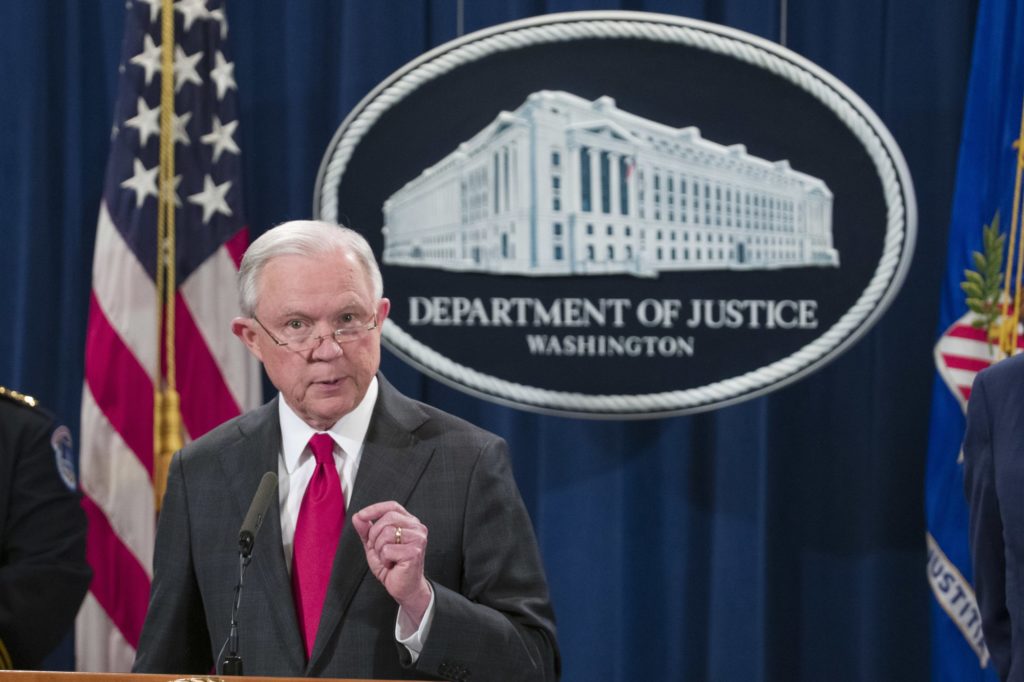
Sensing that Jeff Sessions’ days at the Justice Department may be numbered, some of his supporters want the White House to allow for a graceful exit for an attorney general they believe has dutifully carried out the administration’s agenda even while enduring the president’s fury. It seems unlikely that efforts to soften a possible dismissal after the Nov. 6 midterm election would find sympathy in the White House, where President Donald Trump’s rage remains unabated over the attorney general’s recusal from the Russia investigation. A hand-picked successor could theoretically oversee the rest of the probe in place of Deputy Attorney General Rod Rosenstein. But some supporters say they hope that if and when Sessions is replaced, his record as senator and attorney general will be recognized and not overwhelmed by Trump’s attacks, or that the administration will at least respect the Justice Department by guaranteeing a smooth transition. A scenario advocated by at least one Sessions ally, former Cincinnati Mayor Ken Blackwell, would allow him to remain on the job until January and be permitted to resign on his own then rather than be fired immediately after the midterms. Blackwell said allies have made their case to administration officials that Sessions has successfully pushed the president’s core priorities, including on illegal immigration, and deserves some sort of recognition from the White House that “he has more than a passing grade.” “It is not unknown, from anyone from John Kelly to Jared Kushner, that there is a base of support,” said Blackwell, referring to Trump’s chief of staff and son-in-law. “A portion of that base is ready to continue advocacy for his service.” Newt Gingrich, a former Republican House speaker who is close to the White House and calls himself a longtime “admirer” of Sessions, said he would be open to serving as an intermediary if asked between the White House and Sessions supporters. “He deserves a graceful exit. His career deserves a strong conclusion,” said Gingrich, who called Sessions “a strong conservative who has done strong work at the Department of Justice.” Sessions, who has publicly acknowledged the president’s displeasure, has plowed forward with the conventional duties of the job, including a regular calendar of events and announcements. On Friday, he spoke first at the Justice Department news conference announcing the arrest of a mail-bomb suspect in Florida. The president, though mindful that Sessions remains popular among much of his base, would seem unlikely to sign off on a plan to extend Sessions’ time in office, according to a White House official and an outside adviser familiar with Trump’s thinking but not authorized to publicly discuss private conversations. Trump has repeatedly had to be talked out of firing Sessions before November and has signaled to allies that he wants to make sweeping changes at the Justice Department once the midterms have concluded. He told The Associated Press this month that he was “not thrilled” with Sessions but made no commitment to dismiss him. If Trump were to wait, it would not be out of deference to Sessions, but rather because the White House would be managing the fallout from the midterms and preparing for a pair of presidential overseas trips in November, according to the official. Sessions’ decision to recuse remains his original sin in Trump’s eyes. Trump has fumed that Sessions has not done more to protect his personal interests and has vented about what he sees as Sessions’ failure to get a handle on immigration and his lack of emphasis on combating transnational criminal organizations. Cameron Smith, a former Sessions Senate aide, said, “The idea that this gets better — they stand next to each other and sing common praises — I just don’t see anybody looking at that seriously.” After being berated by Trump over the recusal decision last year, Sessions offered his resignation, but it was rejected. He has been widely viewed as determined to stay in the job because he believes in Trump’s agenda, which largely mirrors his own interests, and reluctant to leave a job for which he gave up a Senate seat. For more than a year, Trump has repeatedly polled advisers as to whether he should fire Sessions. Some of his closest aides, including attorney Rudy Giuliani, have counseled him not to do so, at least not yet. The case that Sessions’ protectors outlined to Trump largely consists of three components: Firing Sessions, a witness in special counsel Robert Mueller’s investigation of obstruction of justice, would add legal peril to his standing in the Russia probe. Doing so would anger the president’s political base, which Trump cares deeply about, especially before the midterms. A number of Republican senators would rebel against the treatment of a longtime colleague and potentially not hold confirmation hearings for a replacement if the GOP holds onto the Senate. Blackwell, the Sessions friend, said conservatives are divided between those who support firing him immediately and those who regard him as loyal to their cause, protective of their ideals and propelling Trump’s agenda. Gingrich, for instance, calls the recusal “inexcusable” even as he professes admiration for Sessions. The ground appears to have softened recently after some influential Republicans, including Sen. Lindsey Graham, suggested Trump would have the right, after the elections, to select a replacement he trusted. Smith said one way Trump could enable a respectful exit would be for the White House to craft a smooth succession plan and allow Sessions to be part of the process. Ed Meese, a Reagan administration attorney general and Sessions friend, said he wasn’t thinking about Sessions’ departure because “I don’t want to see him fired at all.” “I think he’s taken it with grace,” Meese said of Sessions’ response to Trump’s anger. “What he is recused from is less than 1 percent of the department and he has done an outstanding job in everything he’s done in the department.” Republished with permission from the Associated Press.
DOJ lifts secrecy on foreign lobbying opinions
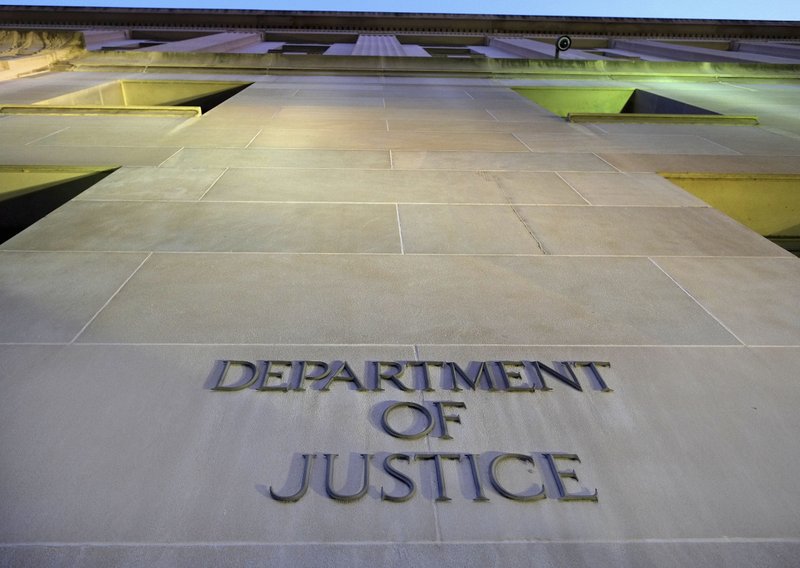
The Justice Department is opening up about the advice it has given to lobbyists who work for foreign governments and political interests. For the first time, the public will be able to read advisory opinions the department has issued to lobbyists, public relations professionals and others about whether they need to register under the Foreign Agents Registration Act, or FARA. The department had kept the opinions secret for decades, a point of contention for transparency advocates and lawyers who specialize in advising clients on complying with the law. The opinions provide an unprecedented view into the thinking of a specialized Justice Department unit whose influence has grown in recent years, propelled by more aggressive enforcement and a special counsel investigation focused on foreign influence operations inside the U.S. The Associated Press obtained copies of dozens of opinions, which were to be posted online later Friday. Those who have requested the department’s guidance include a television host who worked for a company with foreign connections, people negotiating with other governments over the release of prisoners and a firm that planned a U.S. fundraiser for a politician in another country. The department removed the names and other identifying details from the opinions to allow for their public release. In disclosing the opinions, Justice Department officials say they want the public to better understand how they interpret a decades-old law meant to allow Americans to know when foreign entities are trying to influence public opinion or policymakers. The law, enacted in 1938 to unmask Nazi propaganda in the United States, requires people to disclose to the Justice Department when they advocate, lobby or perform public relations work in the U.S. on behalf of a foreign government or political entity. “Today is the law’s 80th anniversary, and it remains a vital tool to combat this threat,” Assistant Attorney General John Demers, the department’s top national security official, said in a statement. “To enhance compliance, we are making these advisory opinions available publicly and online for the first time. By posting these advisory opinions, the Department of Justice is making clearer how we interpret some of FARA’s key provisions.” The heightened enforcement and some high-profile registrations have coincided with special counsel Robert Mueller’s Russia investigation. In the last two years alone, President Donald Trump’s former campaign chairman, Paul Manafort, and former White House national security adviser Michael Flynn have had to register under the law, as has Tony Podesta, a top Democratic lobbyist and brother of Hillary Clinton’s campaign chairman. Manafort is set to go to trial later this year on charges that he concealed his lobbying and influence work on behalf of Ukrainian interests, including a pro-Russian political party. The Justice Department also required the U.S.-based operations of RT, an international television network funded by the Russian government, to register as a foreign agent, a move that angered Russian leaders late last year. U.S. intelligence agencies have alleged RT functioned as a propaganda outlet for the Kremlin as part of an effort to interfere in the 2016 U.S. presidential election. The opinions obtained by the AP show the wide array of requests the Justice Department receives from people and companies trying to determine if they’re obligated to register. In August 2015, for instance, the department determined that a U.S. firm would have to register as a foreign agent if it wanted to host a fundraiser for a candidate running for president in another country. Last February, though, lawyers told a consultant for a foreign government that registration was unnecessary because the work was being done almost entirely outside the United States. That same month, a U.S. organization coordinating with foreign governments in the release of prisoners abroad was told it wouldn’t need to register because the work was humanitarian in nature and not funded by foreign money. Republished with the permission of the Associated Press.
Donald Trump to DOJ: Investigate whether FBI infiltrated campaign
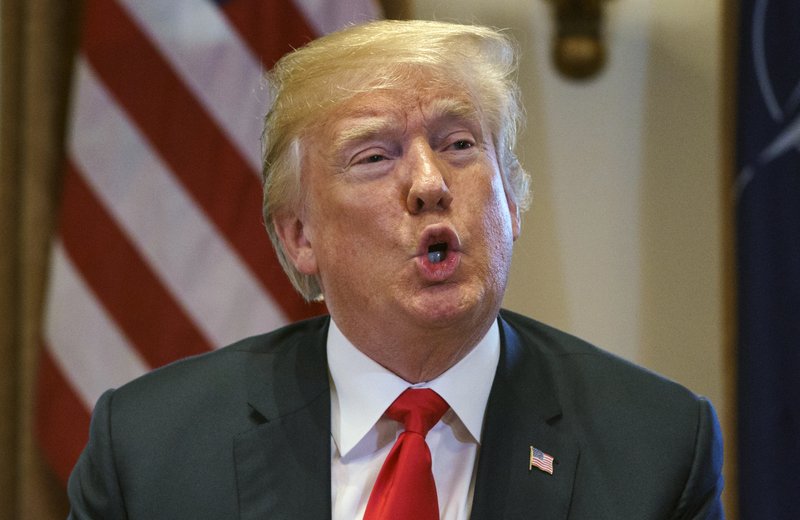
President Donald Trump said he will “demand” that the Justice Department investigate whether the FBI infiltrated his presidential campaign, an extraordinary order that came hours before his legal team said the special counsel indicated the investigation into the president could be concluded by September. Trump tweeted Sunday: “I hereby demand, and will do so officially tomorrow, that the Department of Justice look into whether or not the FBI/DOJ infiltrated or surveilled the Trump Campaign for Political Purposes – and if any such demands or requests were made by people within the Obama Administration!” Trump’s demand puts further pressure on the Justice Department, which later Sunday asked its inspector general to expand an existing investigation into the Russia probe by examining whether there was any improper politically motivated surveillance. It comes as the White House tries to combat the threat posed by special counsel Robert Mueller’s investigation into potential ties between Russia and the Trump campaign. The president’s lawyer, Rudy Giuliani, said Mueller recently shared a timetable that suggested his probe could end by Sept. 1 if Trump were to sit for an interview in July, which is the legal team’s new working plan. “We said to them, ‘If we’re going to be interviewed in July, how much time until the report gets issued?’” Giuliani told The Associated Press on Sunday, referring to the report Mueller is expected to issue to Congress at the conclusion of his investigation. “They said September, which is good for everyone, because no one wants this to drag into the midterms.” Giuliani said he did not want a repeat of what happened in 2016, when FBI Director James Comey announced in the campaign’s final days that he was reopening the investigation into Hillary Clinton’s use of a private email server, a decision Democrats believe cost Clinton the race. Giuliani, the former mayor of New York, also said Mueller’s team indicated that the entire probe could end by September, not just its investigation into potential obstruction of justice. “This would be the culmination of the investigation into the president,” Giuliani said. The special counsel’s office did not respond to a request for comment. It is not certain that Trump will sit for an interview with Mueller, though the president has publicly said he would. Giuliani said a decision would not be made until after Trump’s summit with North Korean leader Kim Jong Un in Singapore, which is slated for June 12. Giuliani said Sunday the two sides “were getting closer” to agreeing on the parameters on a potential interview but would not put the odds of it happening at better than 50/50. Giuliani’s apparent attempt to publicly pressure Mueller on the timeline amid interview negotiations came just hours after Trump’s demand for a new inquiry, which moved beyond his usual blustery accusations of institutional wrongdoing and into the realm of applying presidential pressure on the Justice Department, a move few of his predecessors have made. Trump made the order amid days of public venting about the special counsel investigation, which he has deemed a “witch hunt” that he says has yielded no evidence of collusion between his campaign and Russia. In response, the Justice Department moved Sunday to defuse a growing confrontation with the White House by asking its watchdog to investigate whether there was inappropriate surveillance. It was not immediately clear if that move would satisfy Trump, or if any further demands could lead to a confrontation with FBI Director Christopher Wray or Deputy Attorney General Rod Rosenstein, who is overseeing the Mueller investigation. Rosenstein released a statement Sunday saying, “If anyone did infiltrate or surveil participants in a presidential campaign for inappropriate purposes, we need to know about it and take appropriate action.” The Justice Department probe had begun in March at the request of Attorney General Jeff Sessions and congressional Republicans. Sessions and the lawmakers had urged Inspector General Michael Horowitz to review whether FBI and Justice Department officials abused their surveillance powers by using information compiled by Christopher Steele, a former British spy, and paid for by Democrats to justify monitoring Carter Page, a former campaign adviser to Trump. Horowitz said his office will look at those claims as well as communications between Steele and DOJ and FBI officials. Trump did not elaborate on the promised “demand,” which he included in one of a series of tweets he sent throughout the day Sunday. On Saturday, Trump tweeted, “If the FBI or DOJ was infiltrating a campaign for the benefit of another campaign, that is a really big deal.” He said only the release or review of documents the House Intelligence Committee is seeking from the Justice Department “can give conclusive answers.” Rep. Adam Schiff of California, the senior Democrat on the House Intelligence Committee, called Trump’s claim of an embedded spy “nonsense.” “His ‘demand’ DOJ investigate something they know to be untrue is an abuse of power, and an effort to distract from his growing legal problems,” Schiff tweeted. “Never mind that DOJ has warned that lives and alliances are at risk. He doesn’t care.” Trump’s extraordinary demand of the Justice Department alarmed many observers, who felt it not only violated presidential protocol but also could have a chilling effect on federal law enforcement or its use of informants. Giuliani defended the president’s actions. “As the president’s lawyer, I can’t be concerned on what effect it may have,” he said. “To me, there’s not much of a difference between an informant’s ongoing collection of information in a surreptitious way or a spy. “If this guy was an FBI implant into the campaign,” Giuliani said, “that’s as offensive as Watergate.” The New York Times was the first to report that the FBI had an informant who met several times with Trump campaign officials who had suspicious contacts linked to Russia. Giuliani said the information discovered by the source should eventually be made public and released to Congress, even if the source’s identity is kept confidential. The GOP-led House Intelligence Committee closed its Russian
Prosecutor on Justice’s opioid crackdown favors tough tact

Mary Daly has heard the criticism: That the tough-on-drugs approach favored by the Trump administration is cruel, ineffective and a return to the failed policies of the 1980s. She’s not buying it. “We need to use tough prosecutions if we are going to get our way out of this epidemic,” said Daly, a longtime federal drug prosecutor recently tapped to oversee the Justice Department’s ambitious efforts to attack America’s opioid abuse crisis. “We don’t ignore the need for prevention and treatment efforts, but the notion that tough enforcement is the wrong approach is wrong.” Daly, who prosecuted gang members and drug traffickers for 13 years in New York and Virginia, said her work has given her a close-up look at the drug problem. President Donald Trump and Attorney General Jeff Sessions have made combatting the opioid epidemic a cornerstone of the crime-fighting agenda they both share. Trump has encouraged the use of the death penalty against traffickers when possible, a request Sessions then codified in a directive to federal prosecutors. Daly wasn’t responsible for that policy, but her selection aligns with the tough approach. She said she supports Sessions’ undoing of an Obama-era policy that aimed to show more leniency to lower-level drug offenders. And she favors strict enforcement to rein in the epidemic that saw a record 42,000 opioid related overdose deaths in 2016. The daughter of William Barr, who was attorney general under President George H.W. Bush, Daly was responsible for some of the biggest and most complex international drug trafficking cases in the Eastern District of Virginia, maintaining a heavy case load even as supervisor of the narcotics unit, said James L. Trump, a fellow prosecutor who worked alongside her there. She brought a quiet confidence to the courtroom, and a desire for fairness and consistency, he said. “She believed that adherence to the law and consistency with the law would bring about just results,” said Trump, who has no relation to the president. “If there was a philosophy, it is what I find in most good prosecutors which is that the law is the law, whether our personal beliefs are different in terms of sentencing policy doesn’t really matter.” In her new role, much of Daly’s focus will be on fentanyl, the deadly painkiller fueling the crisis. Under her watch, the Justice Department is going after dealers who use the anonymity of the internet to peddle fentanyl from overseas into American homes, pharmacies and doctors who recklessly overprescribe pain pills, as well as the kind of major traffickers Daly prosecuted in the field. “We have a unique drug on the table in fentanyl. Very small quantities can kill people,” Daly said, adding that the deadly narcotic is showing up in cocaine and other less lethal drugs. “We do have to recalibrate a bit in terms of how we’re addressing the fentanyl threat and that may mean looking at people who are supplying lower quantities.” Both conservative and liberal critics fear such a philosophy could mark a return to the policies of the 1970s and 80s that unduly affected minority communities and flooded prisons by ensnaring mid- to low-level dealers. “It’s deadly, I get that, but that’s why we need to treat it in a really thoughtful way,” said Mark Holden, general counsel for the conservative Koch network. The left-leaning Brennan Center said the department’s focus should be on major traffickers. But it also pointed to efforts to target opioid manufacturers and distributors, which Daly also oversees, as a positive step. Already under Daly’s watch, the Justice Department has thrown its weight behind local officials in hundreds of lawsuits against the manufacturers and distributors of opioid painkillers. Prevention and treatment are also part of the department’s larger strategy, with prosecutors recommending treatment as part of a sentence and grant money devoted to programs. “I would argue they go hand-in-hand,” Daly said. “Oftentimes enforcement provides a good intervention in someone’s life to get them into treatment in a way that nothing else does.” Republished with permission from the Associated Press.
Prosecuting those who lie to buy guns could strain resources

A Trump administration plan to crack down on people who lie to buy guns faces a giant hurdle: It relies on federal agents and prosecutors who are already overwhelmed with other responsibilities. Prosecutors and officials from the U.S. Bureau of Alcohol, Tobacco, Firearms and Explosives have historically preferred to use their limited resources to deal with violent crimes rather than aggressively pursue people who give false information on background check forms. Lying on the forms is a felony, and prosecutors sometimes struggle to win convictions. Still, both sides of the gun control debate welcomed the effort, as President Donald Trump faced criticism for backpedaling from his earlier demands for sweeping reforms in favor of the powerful National Rifle Association. By enforcing existing federal law, Attorney General Jeff Sessions’ plan allows the Trump administration to show it is taking action on gun crime in the aftermath of the Florida school shootings while avoiding more restrictive approaches that would never win approval from gun-rights groups or congressional Republicans. Tens of thousands of people are denied guns each year because of problems with their background checks. But a review by the Justice Department’s inspector general found prosecutions for lying during that process are rare. The ATF referred more than 500 so-called lie-and-try cases to federal prosecutors between 2008 and 2015, the review found, but fewer than 32 cases each year were even considered for prosecution. “We must vigilantly protect the integrity of the background check system through appropriate prosecution of those who attempt to circumvent the law,” Sessions wrote in a memo directing federal prosecutors to bring more cases. It was among several Justice Department initiatives unrolled in response to the shootings in Parkland, Fla., which left 17 people dead. Sessions told federal prosecutors to focus primarily on people denied guns because they are violent felons, fugitives or have domestic violence convictions, which the Justice Department says will help preserve limited resources for cases that pose the greatest threat to public safety. But some current and former law enforcement officials feared that any additional emphasis on such cases would detract from more pressing concerns, such as prosecuting people who buy guns on behalf of felons or those who try to buy guns illegally and are successful. Lie-and-try cases are hard to try in court because prosecutors must convince a jury that a prospective gun buyer intended to lie, rather than just made a mistake or misunderstood what the law allows, which is sometimes the case. And officials stress there are other ways for someone who can’t legally own a gun to get one, such as from private sellers or at gun shows, where federal background checks aren’t required. “There is a reason why they are not getting prosecuted heavily at the moment, and that’s because they are less-than-compelling cases. They’re not getting guns,” John Walsh, a former U.S. attorney in Colorado, said. Walsh’s 2013 testimony about the Obama administration’s gun control proposals quickly turned to a grilling from Republican lawmakers about why so few people were being prosecuted for lying in their attempts to buy guns. An Obama appointee, he argued there was no way the Justice Department could have prosecuted more than a million people who were rejected for gun purchases over a 15-year period. An ATF spokesman said the agency supports the administration’s approach and would shift resources accordingly. There are reasons for concern about those who try and fail to buy guns. Government-funded studies show they are more likely to be arrested in the five years following the denial than in the five years before it. But Walsh said he doubted Sessions’ directive would result in a tidal wave of new cases. The memo asks federal prosecutors to work with local ATF leaders to review their guidelines for handling the cases and to submit a specially tailored plan for approval. It doesn’t say what could happen to U.S. attorney’s offices that don’t comply. “This is in the nature of window dressing,” Walsh said. The move puts additional pressure on the perennially resource-strapped agency at a time when it has already been asked to take on a growing role in the Trump administration’s broader crackdown on violent crime. Trump, for example, ordered ATF to work toward banning rapid-fire bump stocks like those used in last year’s Las Vegas massacre despite the agency’s prior approval of the devices. Extra ATF agents were deployed last summer to cities like Chicago and Baltimore that saw spikes in shootings. “It’s kind of a tiered approach on how you have to manage resources,” said Michael Bouchard, a retired assistant director who is now president of the ATF Association. “You’re going to take people away from doing things that are going to have a significant impact on violent crime.” Lie-and-try prosecutions would not have prevented the shootings in Las Vegas or Florida because the gunmen bought their guns legally. A man who slaughtered more than two dozen parishioners at a Texas church last year got his weapon only because information about his domestic violence conviction was never entered into the federal database. After that shooting Sessions launched a wide-ranging review of the system, which also sought information on the number of recent lie-and-try investigations. But the Justice Department on Tuesday would not release the data or other results of the review beyond an executive summary. Republished with the permission of the Associated Press.
Charlottesville poses new civil rights test for Jeff Sessions
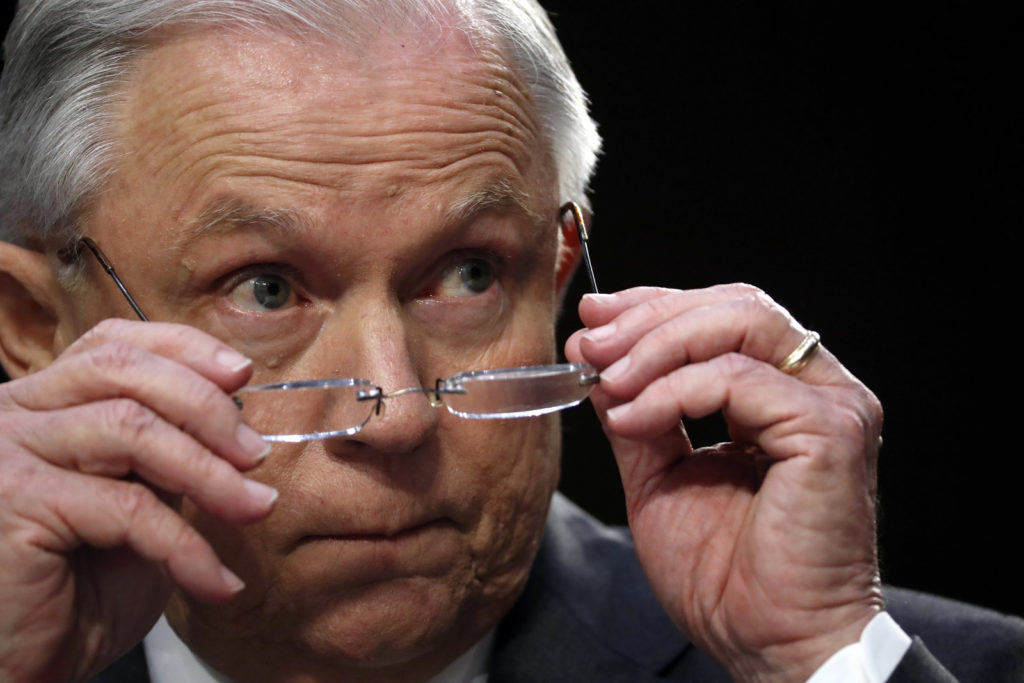
Jefferson Beauregard Sessions, a son of the segregated South who was named after leaders of the Confederacy, faces a tough new test of his commitment to protecting civil rights as he oversees the Justice Department‘s investigation of the deadly violence at a rally of white nationalists in Virginia. Sessions’ political career has been dogged by questions about race, including during his confirmation hearings this year. In his six months as attorney general, he has worked quickly to change how the department enforces civil rights law, particularly in the areas of police reform and voting rights. Yet Sessions was also quick to forcefully condemn the car attack at the neo-Nazi rally in support of a Confederate statue in Charlottesville. His response stood in contrast to that of President Donald Trump, who drew equivalence between the white nationalists and those protesting their beliefs. Sessions denounced racism and bigotry and called the driver’s actions an “evil” act of domestic terrorism worthy of a federal civil rights investigation. Observers say the real test will be in what Sessions does next, given the legal limitations he faces. Federal hate crimes law may not cover the killing even if it was motivated by hate. Federal criminal law has no specific, catchall charge for acts of domestic terrorism. Sessions may decide that the murder charges already leveled against James Alex Fields Jr. in state court are sufficient for justice. “It’s my hope that with the degree of national and international scrutiny, that this department will do the right thing,” said Kristen Clarke, a former hate crimes prosecutor and president of the liberal Lawyers’ Committee for Civil Rights Under Law. “This is a case that the world is watching.” For Sessions, a genial 70-year-old with an Alabama drawl and an uncompromising conservative ideology, leading the Justice Department is the capstone of a decadeslong political career. He has faced questions about his treatment of minorities along the way. As a federal prosecutor in the 1980s, Sessions charged black community activists, who were swiftly acquitted, in a voter fraud case that, along with allegations of racially charged comments, cost him a federal judgeship. As a Republican senator more than 20 years later, he opposed expanding the federal hate crimes statute to protect people based on their sexual orientation and gender identity. Clarke said Sessions’ comments in the days after the Charlottesville attack made her cautiously optimistic, but his history has her concerned. Sessions promised to “advance the investigation toward the most serious charges that can be brought, because this is an unequivocally unacceptable and evil attack that cannot be accepted in America.” But he also acknowledged that deciding whether to bring federal charges won’t be quick or easy. Hate crime cases are often challenging because the government must prove that a suspect was primarily motivated by hatred of the victims’ race or religion, as opposed to their political views. The Charlottesville case could be tricky. The victim, 32-year-old Heather Heyer, was white. That means investigators will have to prove Fields was targeting minorities when he plowed into the crowd, not just anti-racism protesters. Prosecutors can argue that a suspect committed a crime not because of the race of the victim but because of the race of the people on whose behalf she was protesting, said William Yeomans, an American University law fellow and former high-ranking official in the Justice Department’s civil rights division. But that interpretation of the hate crimes law has rarely if ever been used, he said. “It’s a challenge, but I don’t think it’s entirely impossible or shouldn’t be explored,” Yeomans said. “The real measure of (Sessions’) commitment and his success in this case will be the thoroughness of the investigation” even if the case remains in state court. Fields already faces a long sentence if he is convicted in Virginia, so a federal charge could be seen as largely symbolic. Former Attorney General Loretta Lynch, for example, said she brought hate crimes charges in a massacre at a black church in South Carolina because that state has no hate-crimes law, and federal charges were needed to adequately address a motive rooted in racial hate. The latest case is being investigated by career prosecutors and FBI agents, who will make recommendations to Sessions. The FBI would not describe the scope of the resources it has devoted to the investigation, but there are signs it is a priority. Agents were looking for clues in Fields’ hometown in Ohio the day of the attack. Sessions has said prosecuting hate crimes is a priority of his civil rights division. Yet he is reshaping the unit in other ways that make advocates nervous. Under Sessions, the department has expressed support for a strict Texas voter ID that a federal judge last month found discriminates against minorities; backed off court-enforceable improvement plans for troubled police agencies; and told local school districts they no longer must allow transgender students to use the bathrooms of their choice. The department declined to comment further on Sessions’ thinking about the Charlottesville case. Sessions has not said whether he personally favors the removal of Confederate monuments such as the one memorializing Robert E. Lee at the center of the Charlottesville violence. He has said only that cities should make that choice free from violence. His supporters say neither emotions nor his past will guide him in the investigation. “He will look at it from a very legal perspective. Was a crime committed, and what are we going to do to get a conviction?” said Armand DeKeyser, who worked closely with Sessions and became his chief of staff in the Senate. “He won’t be governed by emotion.” Republished with permission from the Associated Press.
Cities baffled as Jeff Sessions targets them on immigration
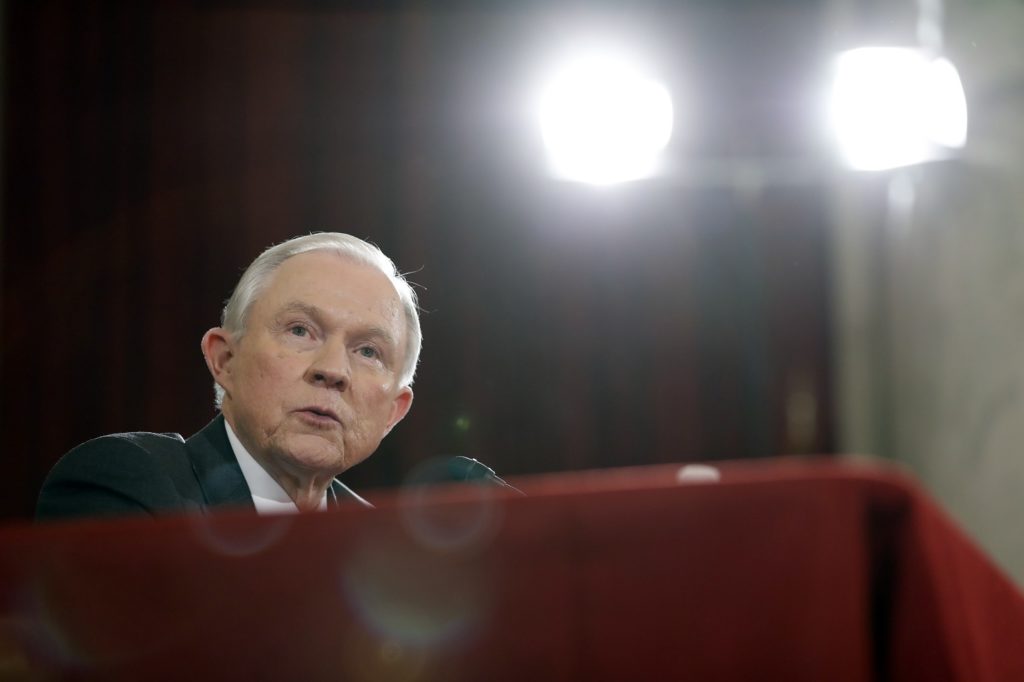
Attorney General Jeff Sessions took new steps Thursday to punish cities he believes are not cooperating with federal immigration agents in a move that was met with bewilderment by local officials who said they did not know why they were being singled out. The Justice Department sent letters to four cities struggling with gun violence, telling them they would not be eligible for a program that provides money to combat drug trafficking and gang crime unless they give federal immigration authorities access to jails and notify agents before releasing inmates wanted on immigration violations. Baltimore, Albuquerque, and Stockton and San Bernardino in California all expressed interest in the Justice Department’s Public Safety Partnership, which enlists federal agents, analysts and technology to help communities find solutions to crime. “By taking simple, commonsense considerations into account, we are encouraging every jurisdiction in this country to cooperate with federal law enforcement,” Sessions said in a statement that accompanied the letters. “That will ultimately make all of us safer – especially law enforcement on our streets.” The threat marks Sessions’ latest effort to force local authorities to help federal agents detain and deport people living in the country illegally as part of a push to reduce crime he believes is linked to illegal immigration. The attorney general has repeatedly vowed to withhold federal money from cities that do not cooperate, similar to how previous administrations have held back highway funds during debates over the speed limit and drinking age. But it was not immediately clear to some of the cities why they were targeted. In a letter to Sessions, Republican Albuquerque Mayor Richard Berry denied that New Mexico’s largest city is a sanctuary for immigrants living in the country illegally and said he has been trying to work with immigration authorities since taking office in 2009. In fact, Berry said, Immigration and Customs Enforcement staffing at the prison transport center fell in recent years. “If your agency has questions or concerns with our (Bernalillo) County jails, I would refer you to their leadership,” Berry wrote. Peter Simonson, executive director of the American Civil Liberties Union in New Mexico, called the demands “a bullying tactic.” Another concern raised by cities is that police who patrol the streets book suspects into jails run by county or state authorities over which they have no control. The Justice Department’s letters focus on giving federal immigration agents access to such detention facilities. In San Bernardino, officers book anyone they arrest into jails that are run by the county, not the Southern California city of 216,000 people, said Police Chief Jarrod Burguan. “The city of San Bernardino has never taken any formal act to declare itself a sanctuary city,” Burguan said. “Our policies have been very, very consistent over the years.” Stockton Police Chief Eric Jones said his officers also book suspects into a county-run facility and are tasked with fighting violent crime, not enforcing federal immigration laws. “That does not mean we don’t work with our other federal partners, but that is just not a function of ours,” he said. Nor do police enforce immigration laws in Baltimore, where arrestees are taken to a jail run by the state, said Anthony McCarthy, a spokesman for Mayor Catherine Pugh. The state says it adheres to federal policies on immigration in its detention system. “We are receiving tremendous federal support for the violence-reduction actions, and we wouldn’t want anything to deter the progress we hope to make on that front,” McCarthy said. Sessions has pledged to make fighting immigration and street crime the Justice Department’s top priority, but the strategy is putting him at odds with some city leaders, who say the best way to fight crime and build community trust is to keep local police out of federal immigration matters. Last week, Sessions told cities they must meet the same conditions or lose out on millions of dollars from a separate grant program that helps police departments pay for everything from bulletproof vests to body cameras, a move that made some local officials more defiant. In the four letters, the Justice Department asked the prospective cities’ police departments to show proof of their compliance by Aug. 18. In Albuquerque, immigrant student activists said the letter was part of the Trump administration’s broader attack on immigrants. “It is a vision of terror for families like mine,” said Gabriela Hernandez, Southwest Organizer for United We Dream. The Justice Department in June tapped 12 cities to receive aid through the Public Safety Partnership, and officials said the four cities targeted Thursday had expressed interest in the next chance at participating. Cities were chosen based on higher-than-average rates of violence and willingness to receive the help and training. Cities that want to be involved going forward will have to show they allow unfettered communication between police and federal immigration authorities, give agents access to jails in order to question immigrants and provide agents with 48 hours of notice when someone in the country illegally is about to be released. Republished with permission of The Associated Press.
James Comey testimony leaves question about Jeff Sessions unanswered
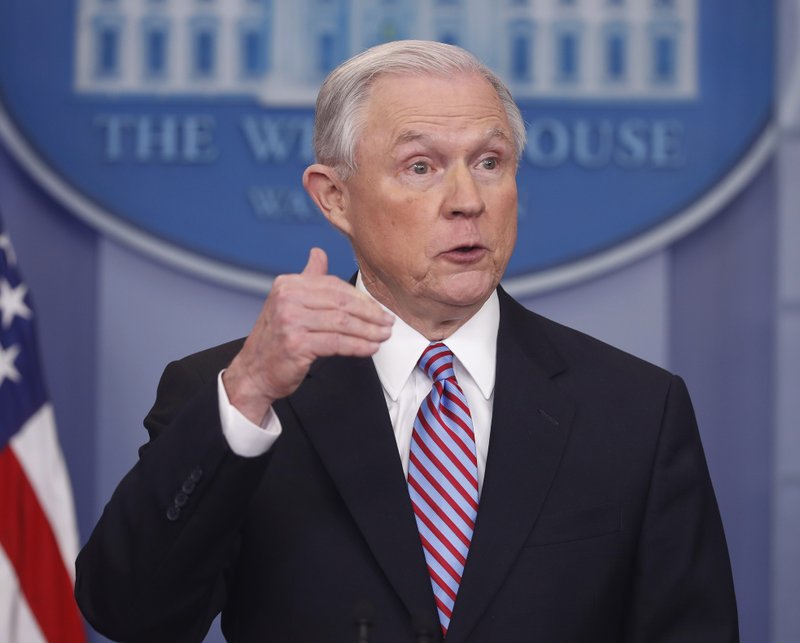
Ousted FBI Director James Comey provided a lot of answers during his public testimony before a Senate committee, but he left one substantial question unanswered: How did the FBI know Attorney General Jeff Sessions was going to step aside from the investigation into the Trump campaign’s Russia ties? The Justice Department responded late Thursday, saying that after consultations with department ethics officials Sessions recused himself because of his involvement in Trump’s 2016 presidential campaign, “for that reason, and that reason alone.” The department’s statement did not directly respond to Comey’s comment that he was “aware of facts” that would make Sessions’ continued involvement in the Russia probe problematic. Nor did it explain why Comey said he could not discuss those reasons in public. Comey testified that President Donald Trump had expressed hope he would end an FBI investigation into former national security adviser Michael Flynn. Comey said the request made him uncomfortable, but he chose not to relay that information to Sessions because he was convinced the attorney general would recuse himself from Russia-related matters. Career Justice Department officials had been recommending he step aside, Comey said. Sessions, a close Trump adviser, withdrew from the Russia investigation March 2 after acknowledging two previously undisclosed contacts with Russian Ambassador Sergey Kislyak last summer and fall. The Justice statement Thursday made no mention of that issue. Sens. Patrick Leahy, D-Vt., and Al Franken, D-Minn., last week released a letter urging the FBI to investigate whether Sessions had falsely testified under oath when he said at his January confirmation hearing that he hadn’t had any contacts with Russia. In addition to the two meetings that Sessions has acknowledged, the senators pointed to the possibility of a separate encounter at an April 2016 Trump campaign event that Sessions and Kislyak attended. The Justice Department has acknowledged that Sessions was at the Mayflower Hotel event in Washington, but said there were no private or side conversations that day. Comey’s statement resonated Thursday on Capitol Hill. Democratic lawmakers, some of whom were already concerned that Sessions’ involvement in Comey’s May 9 firing violated his recusal, said they would make it a top priority. The fact that information about Sessions was classified and Comey couldn’t answer “means there’s something out there that he knows about that the public doesn’t, and that he thinks bears on a need for Sessions to recuse himself in matters that relate to Russia,” said Sen. Sheldon Whitehouse, D-R.I. Sen. Ron Wyden, D-Ore., said he could “spend a lot of time on this in the days ahead.” Comey also said he didn’t know whether Sessions had violated the terms of his recusal, and that would depend on whether the reason for his firing was related to the Russia investigation. Justice Department spokesman Ian Prior said Sessions “has not been briefed on or participated in any investigation within the scope of his recusal.” Meanwhile Thursday, White House spokeswoman Sarah Huckabee Sanders said Trump “absolutely” has confidence in Sessions. The statement came two days after White House spokesman Sean Spicer declined to say whether Trump had confidence in his attorney general. Republished with permission of The Associate Press.
White House looks for ways to undermine James Comey’s credibility
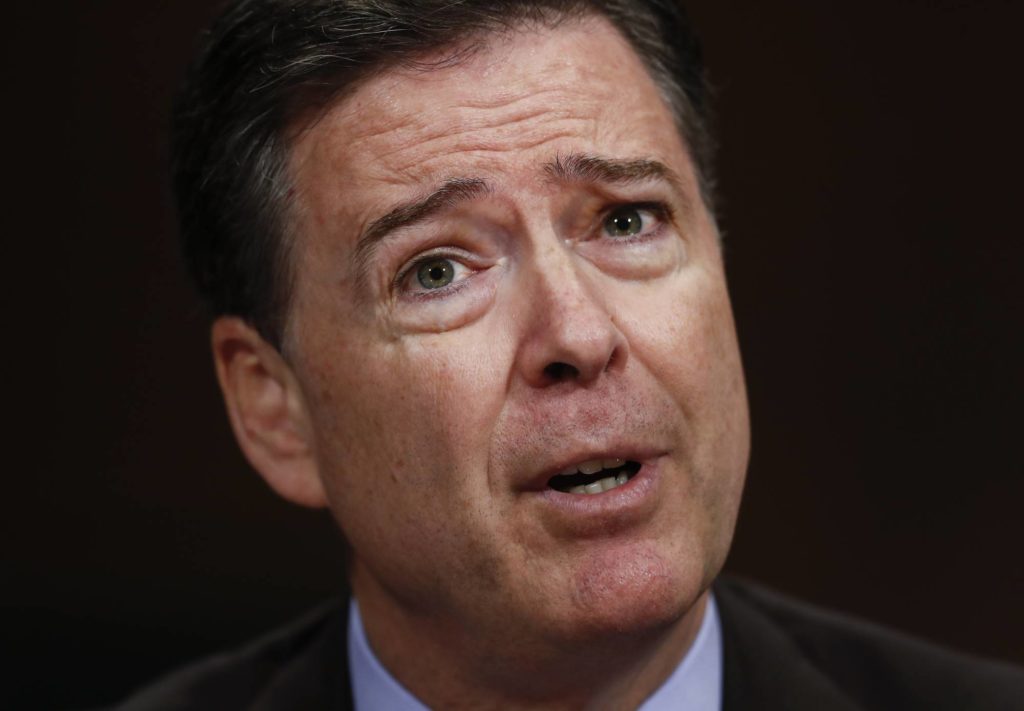
With fired FBI Director James Comey’s highly anticipated congressional testimony just a day away, the White House and its allies are scrambling for ways to offset potential damage. Asked Tuesday about the testimony, President Donald Trump was tight-lipped: “I wish him luck,” he told reporters. Comey’s testimony Thursday before the Senate intelligence committee could expose new details regarding his discussions with Trump about the federal investigation into Russia’s election meddling. Comey could also bring up other aspects of his dealings with the Trump administration. On Tuesday evening a person familiar with the situation said Comey had told Attorney General Jeff Sessions that he did not want to be left alone with Trump. The person, who was not authorized to discuss the matter by name and spoke on condition of anonymity, told The Associated Press the comment was made because of concerns Comey had about Trump. It was not immediately clear when the conversation occurred. But The New York Times, which first reported the interaction with Sessions, said it came after Trump had asked Comey in February to end an FBI investigation into Trump’s first national security adviser, Michael Flynn. Justice Department spokesman Ian Prior declined to comment. He said Sessions “doesn’t believe it’s appropriate to respond to media inquiries on matters that may be related to ongoing investigations.” Trump’s White House and its allies are crafting a strategy aimed at undermining Comey’s credibility. Both White House officials and an outside group that backs Trump plan to hammer Comey in the coming days for misstatements he made about Democrat Hillary Clinton’s emails during his last appearance on Capitol Hill. An ad created by the pro-Trump Great America Alliance — a nonprofit “issues” group that isn’t required to disclose its donors — casts Comey as a “showboat” who was “consumed with election meddling” instead of focusing on combating terrorism. The 30-second spot is slated to run digitally on Wednesday and appear the next day on CNN and Fox News. The Republican National Committee has been preparing talking points ahead of the hearing, which will be aired live on multiple TV outlets. An RNC research email Monday issued a challenge to the lawmakers who will question Comey. There’s bipartisan agreement, the email says, that Comey “needs to answer a simple question about his conversations with President Trump: If you were so concerned, why didn’t you act on it or notify Congress?” Comey’s testimony marks his first public comments since he was abruptly ousted by Trump on May 9. Since then, Trump and Comey allies have traded competing narratives about their interactions. The president asserted that Comey told him three times that he was not personally under investigation, while the former director’s associates allege Trump asked Comey if he could back off an investigation into Michael Flynn, who was fired as national security adviser because he misled the White House about his ties to Russia. Democrats have accused Trump of firing Comey to upend the FBI’s Russia probe, which focused in large part on whether campaign aides coordinated with Moscow to hack Democratic groups during the election. Days after Comey’s firing, the Justice Department appointed a special counsel, former FBI Director Robert Mueller, to oversee the federal investigation. The new revelation about Comey’s uneasiness with Trump brings to mind a posting last month by Comey friend Benjamin Wittes on his Lawfare blog, in which he said Comey “saw it as an ongoing task on his part to protect the rest of the Bureau from improper contacts and interferences from a group of people he did not regard as honorable.” Despite the mounting legal questions now shadowing the White House, Trump has needled Comey publicly. In a tweet days after the firing, he appeared to warn Comey that he might have recordings of their private discussions, something the White House has neither confirmed nor denied. White House officials appear eager to keep the president away from television and Twitter Thursday, though those efforts rarely succeed. White House spokesman Sean Spicer said the president plans to attend an infrastructure summit in the morning, then address the Faith and Freedom Coalition’s “Road to Majority” conference at 12:30 p.m. “The president’s got a full day on Thursday,” Spicer said. The White House had hoped to set up a “war room” stocked with Trump allies and top-flight lawyers to combat questions about the FBI and congressional investigations into possible ties between the campaign and Russia. However, that effort has largely stalled, both because of a lack of decision-making in the West Wing and concerns among some potential recruits about joining a White House under the cloud of investigation. “If there isn’t a strategy, a coherent, effective one, this is really going to put us all behind the eight ball. We need to start fighting back. And so far, I don’t see a lot of fight,” said Barry Bennett, a former Trump campaign aide. Still, Trump supporters say they are willing to step in to help the White House deflect any accusations from Comey. “If we feel he crosses a line, we’ll fire back,” said Ed Rollins, chief strategist of Great America PAC, the political arm of the group airing the Comey ad. Republished with permission of The Associated Press.
Donald Trump to James Comey: Better hope there are no ‘tapes’ of talks

President Donald Trump, in an apparent warning to his fired FBI director, said Friday that James Comey had better hope there are no “tapes” of their conversations. Trump’s tweet came the morning after he asserted Comey had told him three times that he wasn’t under FBI investigation. “I said, ‘If it’s possible, would you let me know, am I under investigation?’ He said you are not under investigation,” Trump said in an interview Thursday with NBC News. He said the discussions happened in two phone calls and at a dinner in which Comey was asking to keep his job. Comey has not confirmed Trump’s account. Late Thursday, The New York Times cited two unnamed Comey associates who recounted his version of a January dinner with the president in which Trump asked for a pledge of loyalty. Comey declined, instead offering “honest.” When Trump then pressed for “honest loyalty,” Comey told him, “You will have that,” the associates said. White House spokeswoman Sarah Huckabee Sanders disputed the report and said the president would “never even suggest the expectation of personal loyalty.” Officials did not immediately respond to questions about whether Trump recorded his discussions with the FBI director. The president’s morning Twitter comments again raised the specter of Richard Nixon, who secretly taped conversations and telephone calls in the White House during the Watergate investigation that ultimately led to his downfall. Trump’s firing of Comey already has left him with the dubious distinction of being the first president since Nixon to fire a law enforcement official overseeing an investigation tied to the White House. Even before Trump’s provocative tweet, the White House was scrambling to clarify why Comey was fired. Trump told NBC he had planned to fire Comey all along, regardless of whether top Justice Department officials recommended the stunning step. The White House initially cited a Justice Department memo criticizing Comey’s handling of last year’s investigation into Hillary Clinton‘s emails as the impetus for Trump’s decision. But Trump on Thursday acknowledged for the first time that the Russia investigation — which he dismissed as a “made-up story” — was also on his mind as he ousted the man overseeing the probe. The shifting accounts of the decision to fire Comey, whom Trump derided as a “showboat” and “grandstander,” added to a mounting sense of uncertainty and chaos in the West Wing, as aides scrambled to get their stories straight and appease an angry president. Not even Vice President Mike Pence was spared the embarrassment of having told a version of events that was later discredited by Trump. The White House’s explanations continued to crumble throughout the day Thursday. On Capitol Hill, acting FBI Director Andrew McCabe strongly disputed the White House’s assertion that Comey had been fired in part because he had lost the confidence of the FBI’s rank-and-file. “That is not accurate,” McCabe said. “Director Comey enjoyed broad support within the FBI and still does to this day.” Unfazed, Sanders insisted she had heard from “countless” members of the FBI who welcomed the president’s decision. McCabe also pointed out the remarkable nature of Trump’s version of his conversations with Comey. McCabe told a Senate panel it was not “standard practice” to tell an individual whether they are or are not under investigation. Previous presidents have made a public show of staying out of legal matters, so as not to appear to be injecting politics. Trump’s comments demonstrated his striking deviation from that practice. The ousted director himself is said to be confident that his own version of events will come out, possibly in an appearance before Congress, according to an associate who has been in touch with him since his firing Tuesday. Trump and Comey’s relationship was strained early on, in part because of the president’s explosive and unsubstantiated claims that Barack Obama wiretapped Trump Tower. Comey found the allegations confounding, according to his associate, and wondered what to make of what he described as strange thoughts coming from his new boss. The president was no kinder to Comey on Thursday, calling him names and saying he’d left the FBI in “virtual turmoil.” He said that while he received a scathing assessment of Comey’s performance from Deputy Attorney General Rod Rosenstein on Monday, that memo was not a catalyst for his dramatic decision as the White House had said earlier. “I was going to fire Comey,” Trump said. “Regardless of recommendation, I was going to fire Comey.” That’s far different from the White House’s initial account in the hours after Comey’s firing. Multiple officials, including Pence, said the president was acting at the behest of Rosenstein and Attorney General Jeff Sessions. But it quickly became clear that the president had been stewing for days over the Russia investigation and Comey’s refusal to defend him in appearances before lawmakers. By Wednesday afternoon, the officials, like Trump, were saying he had in fact been considering ousting the FBI director for months because of a lack of confidence in his ability to lead the agency. And the Russia investigation was still on his mind. “In fact when I decided to just do it, I said to myself, I said you know, this Russia thing with Trump and Russia is a made-up story, it’s an excuse by the Democrats for having lost an election that they should have won,” he said. Sanders attributed the disconnect in the week’s explanations to the fact that she had not directly asked Trump when he’d made the decision to fire Comey until shortly before Thursday’s press briefing. White House officials and others insisted on anonymity in order to disclose private conversations and internal deliberations. The White House said Trump is weighing options for replacing Comey, a decision that could have broad implications for the future of the Russia investigation. Some senior officials have discussed nominating Rep. Trey Gowdy, the South Carolina Republican who ran the House committee that investigated Secretary of State Hillary Clinton’s actions in connection with the 2012 attack on a U.S. compound
US prosecutors told to push for more, harsher punishments
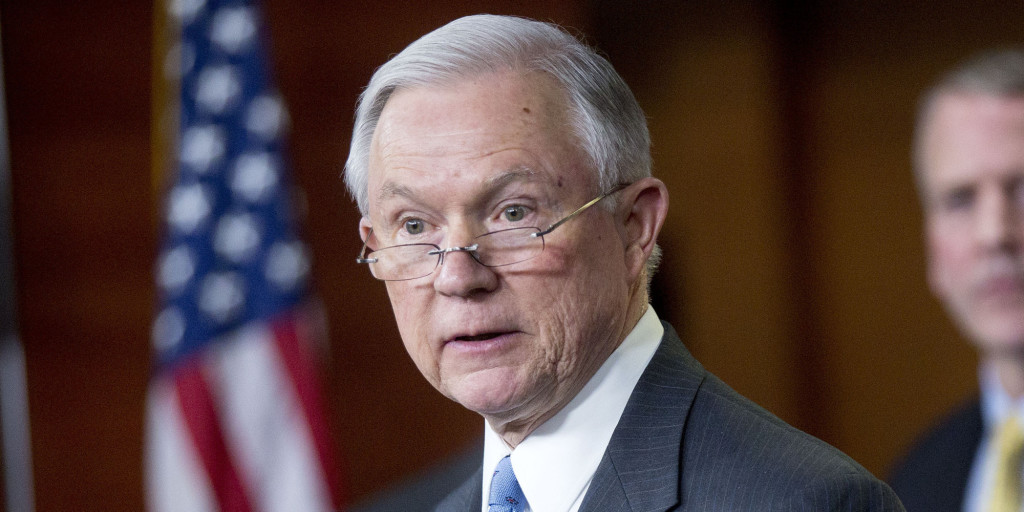
Attorney General Jeff Sessions is directing federal prosecutors to pursue the most serious charges possible against the vast majority of suspects, a reversal of Obama-era policies that is sure to send more people to prison and for much longer terms. The move has long been expected from Sessions, a former federal prosecutor who cut his teeth during the height of the crack cocaine epidemic and who has promised to make combating violence and drugs the Justice Department‘s top priority. “This policy affirms our responsibility to enforce the law, is moral and just, and produces consistency,” Sessions wrote in a memo sent Thursday night to U.S. attorneys and made public early Friday. The move amounts to an unmistakable undoing of Obama administration criminal justice policies that aimed to ease overcrowding in federal prisons and contributed to a national rethinking of how drug criminals were prosecuted and sentenced. Critics said the change will subject more lower-level offenders to unfairly harsh mandatory minimum sentences. Sessions contends a spike in violence in some big cities and the nation’s opioid epidemic show the need for a return to tougher tactics. “The opioid and heroin epidemic is a contributor to the recent surge of violent crime in America,” Sessions said in remarks prepared for a Thursday speech in Charleston, West Virginia. “Drug trafficking is an inherently violent business. If you want to collect a drug debt, you can’t, and don’t, file a lawsuit in court. You collect it by the barrel of a gun.” The policy memo says prosecutors should “charge and pursue the most serious, readily provable offense” — something more likely to trigger mandatory minimum sentences. Those rules limit a judge’s discretion and are typically dictated, for example, by the quantity of drugs involved in a crime. The memo concedes there will be cases in which “good judgment” will warrant a prosecutor to veer from that rule. But any exceptions will need to be approved by top supervisors, and the reasons must be documented, allowing the Justice Department to track the handling of such cases by its 94 U.S. attorney’s offices. And even if they opt not to pursue the most serious charges, prosecutors are still required to provide judges with all the details of a case when defendants are sentenced, which could lengthen prison terms. The requirements “place great confidence in our prosecutors and supervisors to apply them in a thoughtful and disciplined manner, with the goal of achieving just and consistent results in federal cases,” the memo states. The directive rescinds guidance by Sessions’ Democratic predecessor, Eric Holder, who told prosecutors they could in some cases leave drug quantities out of charging documents so as not to trigger long sentences. Holder’s 2013 initiative, known as “Smart on Crime,” was aimed at encouraging shorter sentences for nonviolent drug offenders and preserving Justice Department resources for more serious and violent criminals. Though Holder did say that prosecutors ordinarily should charge the most serious offense, he instructed them to do an “individualized assessment” of the defendant’s conduct. And he outlined exceptions for not pursuing mandatory minimum sentences, including if a defendant’s crime does not involve violence or if the person doesn’t have a leadership role in a criminal organization. The Obama policy shift coincided with U.S. Sentencing Commission changes that made tens of thousands of federal drug prisoners eligible for early release, and an Obama administration clemency initiative that freed convicts deemed deserving of a second chance. Combined, those changes led to a steep decline in a federal prison population that now stands at just under 190,000, down from nearly 220,000 in 2013. Nearly half of those inmates are in custody for drug crimes, records show. Obama administration officials cited that decline and a drop in the overall number of drug prosecutions as evidence that policies were working as intended. They argued prosecutors were getting pickier about the cases they were bringing and were seeking mandatory minimum sentences less often. Still, some prosecutors felt constrained by the Holder directive and expressed concern that they’d lose plea bargaining leverage — and a key inducement for cooperation — without the ability to more freely pursue harsher punishments. Sessions and other Justice Department officials argue Holder’s approach sidestepped federal laws that impose such sentences and created inconsistency across the country in the way defendants are punished. Even while in the Senate, Sessions repeatedly asserted that eliminating mandatory minimums weakened the ability of law enforcement to protect the public. Advocates for the previous policy said the change will revive the worst aspects of the drug war. “It looks like we’re going to fill the prisons back up after finally getting the federal prison population down,” said Kevin Ring, president of Families Against Mandatory Minimums. “But the social and human costs will be much higher.” Republished with permission of The Associated Press.
Mayors grapple with grant threat after meeting with Jeff Sessions
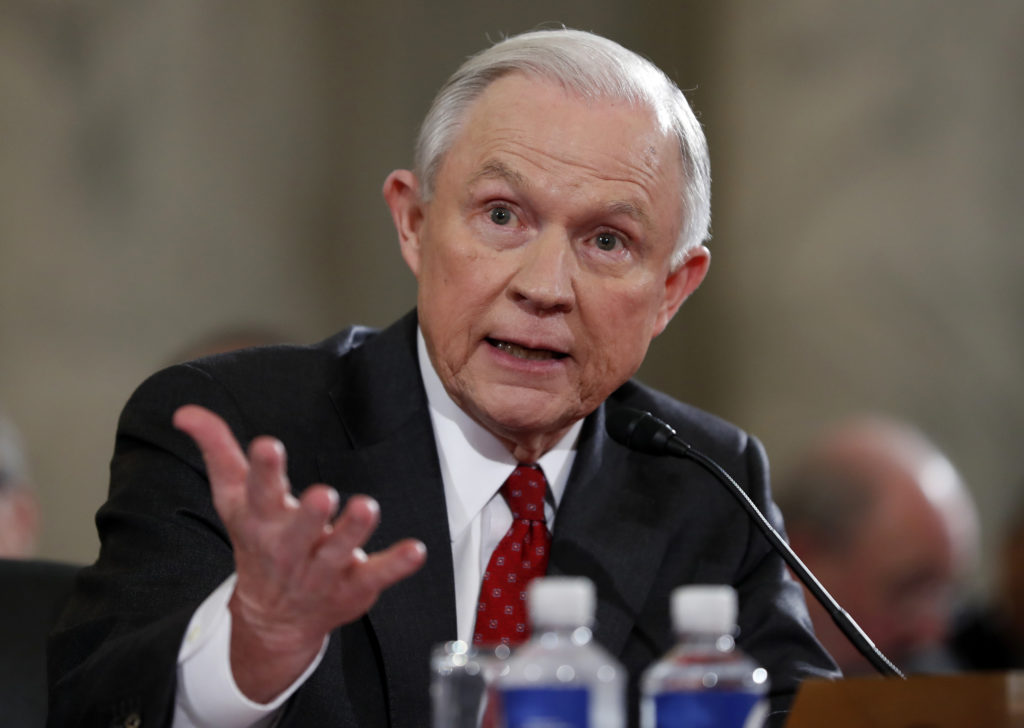
Mayors from several U.S. cities threatened with the loss of federal grants emerged from a meeting with the attorney general Tuesday saying they remain confused about how to prove their police aren’t prohibited from cooperating with immigration authorities — a requirement for the money. The Justice Department has warned some jurisdictions that they could lose some law enforcement grant money if they don’t prove their local police and sheriffs are able to share information with federal immigration authorities about the citizenship status of people in their custody. Attorney General Jeff Sessions has labeled cities that bar such information-sharing as “sanctuary cities.” “We want all jurisdictions to enthusiastically support the laws of the United States that require the removal of criminal aliens, as many jurisdictions already do,” Sessions said in a statement released after the meeting with representatives of the U.S. Conference of Mayors. But the officials who met with Sessions said practical questions remain about how to follow the rules. For example, does that mean a sheriff’s department must tell Immigration and Customs Enforcement about an inmate’s incarceration by phone? Or will an inmate’s fingerprint information, taken by the jail and then shared with the FBI and ICE, be enough? And how long can a local jail hold someone for immigration authorities without violating their rights? “We got more clarity than we’ve ever received, but we also have other thorny issues to sort through,” said Jorge Elorza, the mayor of Providence, Rhode Island, after the hour-long meeting. It was the first time the delegation of mayors met with Sessions since the department sent nine jurisdictions letters on Friday warning they would lose key grant money unless they document cooperation with immigration authorities. The jurisdictions, which include the state of California and major cities like Chicago, New York and Philadelphia, were places the Justice Department’s inspector general previously identified as having barriers to information-sharing among local police and immigration officials. Some disputed they met the “sanctuary city” title. New Orleans Mayor Mitch Landrieu, whose city received one of the letters, said he provided Sessions with proof of compliance during Tuesday’s meeting but remained stunned the city received a warning in the first place, as it drafted its policies in consultation with federal immigration and Homeland Security officials. The delegation also included mayors from Columbia, South Carolina; Gary, Indiana; and Austin, Texas. The meeting touched on a number of other concerns related to the Trump administration’s immigration policies they said remain confusing. On a number of immigration issues, “we hear very different messages from (Homeland Security), DOJ and also the White House,” Elorza said. “Just give us clarity and please have one, clear policy so we can know where we stand.” Republished with permission of The Associated Press.


